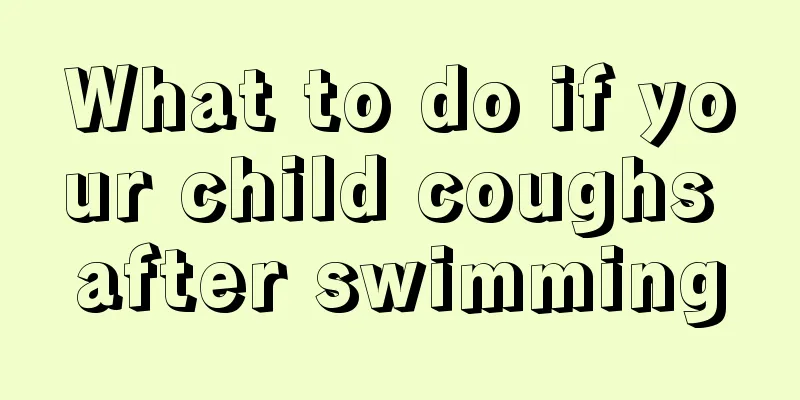What to do if your child coughs after swimming

|
Children like to play in the water, so many parents will take their children to the swimming pool to play, which not only allows the children to have fun, but also allows them to learn a skill. What should some parents do if they find that their children cough after swimming? This may be because the child had symptoms of a cold or cough before swimming, and the condition worsened after swimming, so you must ensure the baby's physical condition before taking the baby swimming. 1. Can babies swim if they have a cold or cough? It is not recommended for babies to go swimming if they have a cold or cough. The most taboo thing when your baby has a cold and cough is to let the baby catch a cold again. At this time, the baby's resistance is very weak, and going out for swimming can easily make the baby catch a cold and aggravate the condition. Moreover, babies with colds and coughs do not have enough physical strength. Swimming at this time will not serve as exercise, but will consume the baby's physical strength, which is not conducive to recovery from the cold. In addition, swimming and diving can induce otitis media due to the pressure, so you should be more careful, especially after a cold. Children under 5 years old have a higher incidence of otitis media. 2. Benefits of baby swimming 1. Promote height and weight growth. 2. Improve the sensitivity of baby's sensory cells and body coordination. 3. Stimulate and promote brain nerve development, and significantly improve intelligence level. 4. Establish the baby's sense of security and trust in the new environment, and cultivate self-confidence and adaptability. 5. Promote food digestion and absorption and reduce bad sleeping habits. 6. It strengthens the body and improves immunity. 7. It helps babies develop healthy and happy emotions. 3. Precautions for baby swimming 1. The water temperature should be appropriate and should be maintained at 26℃ to 30℃. The height of the water should depend on the height of the baby, as long as the baby's feet are at a certain distance from the bottom of the pool when floating. 2. The neck collar for baby swimming must be inspected for safety, such as whether it is leaking and whether the safety buckle is functioning normally. Also, pay attention to whether the size of the collar is suitable for the baby's neck. 3. When putting the baby into the water, be sure to be gentle to avoid making the baby nervous. When putting the baby into water, parents should always pay attention to the baby's skin color and complexion. 4. Feed your baby before swimming to ensure the baby's energy supply. To control your baby's swimming time, 15 minutes each time and once a week is enough. 5. After the baby finishes swimming, you should immediately wipe off the water on the baby's body with your hands to prevent the baby from catching a cold. If your baby shows any abnormalities in his body later, you should consult relevant professionals immediately. 6. Babies with certain diseases are not suitable for swimming, such as otitis media, broken skin, infectious diseases and heart disease. It is worth mentioning that all parents should consult a doctor before letting their baby swim. |
<<: Can children use moxibustion?
>>: Children with elevated platelets
Recommend
How to supplement calcium for 3-year-old baby
Everyone knows that the most indispensable elemen...
Why is the back of the baby's hand blue?
We parents will be very nervous about our childre...
What are the symptoms of hernia in children?
Most people think that children are very weak whe...
Root canal treatment for children with tooth decay
Children with more serious tooth decay can be tre...
Baby high fever convulsions
If a baby has a high fever and is accompanied by ...
How to care for a baby who drools for more than two months
In the newborn period, babies generally do not dr...
What causes children to twitch before sleep?
When sleeping at night, many children will have c...
How to make baby's hair grow thicker? These eight points must be followed!
If you find that your baby's hair is obviousl...
Why do children often have tinnitus?
Many adults have experienced tinnitus, most of wh...
What happens if my child has blood in his stool?
Although defecation is considered to be a very in...
Is it okay for kids to do sit-ups?
Children are in the stage of physical development...
Child has a black chin?
In life, some people are darker and some are ligh...
How to check for tuberculosis in children
Tuberculosis is known as the second largest infec...
The reason why babies always hum when they sleep
Babies are very restless when they sleep. Sometim...
Symptoms of otitis media in children
Otitis media is a very common ear disease, especi...









